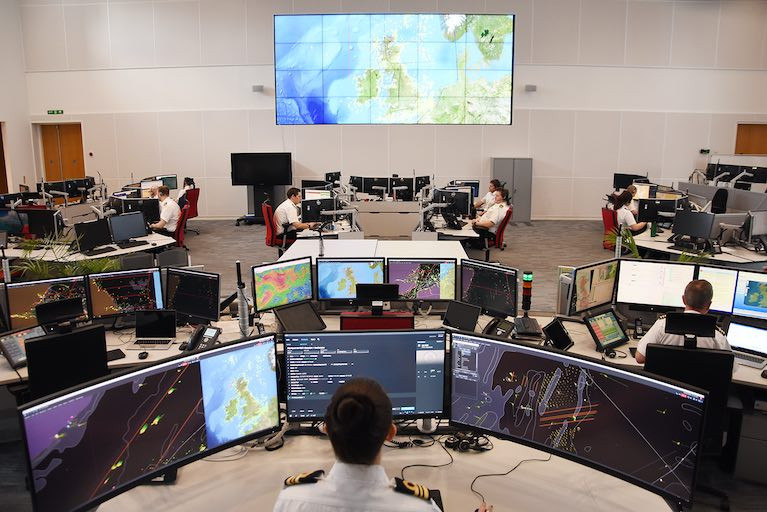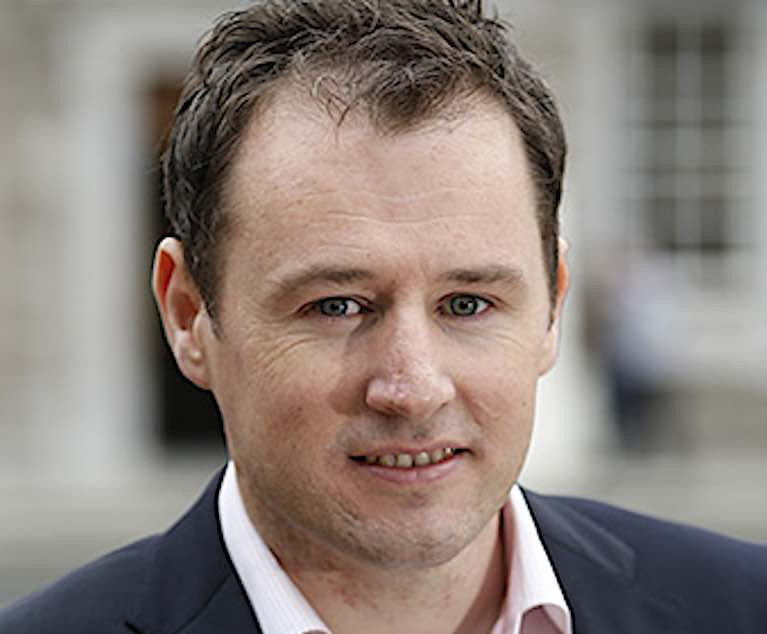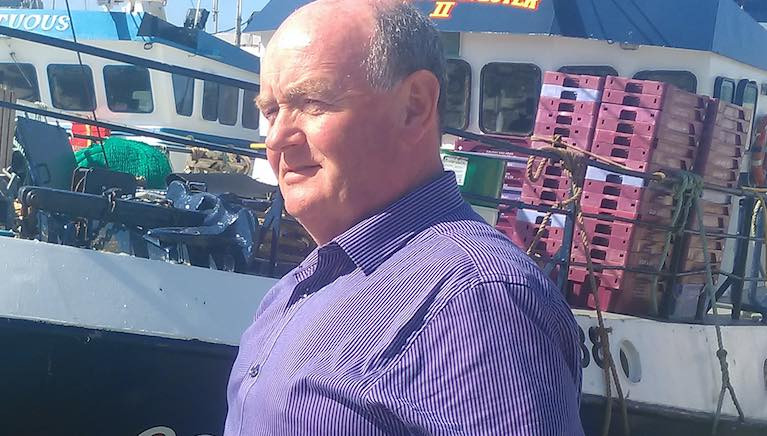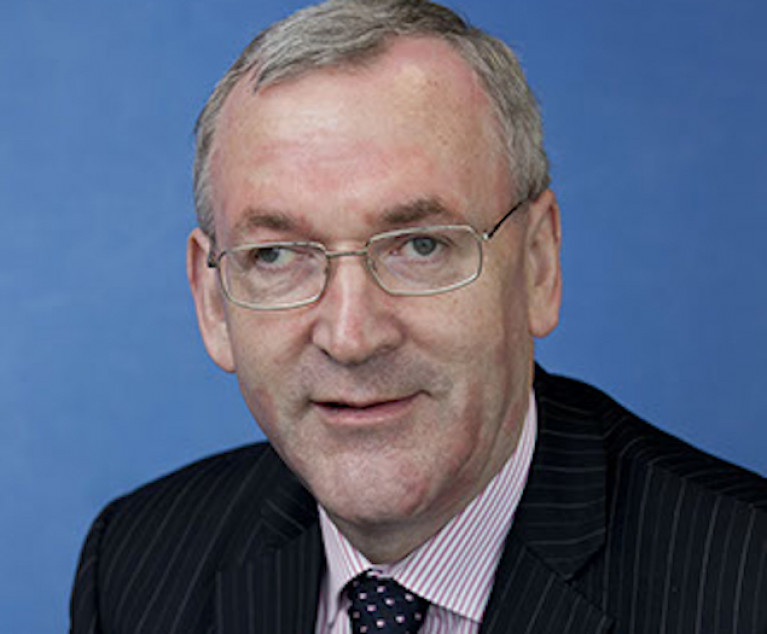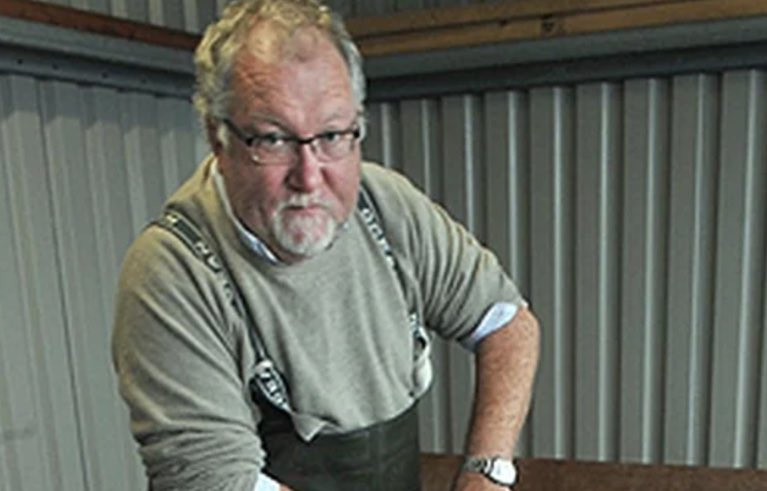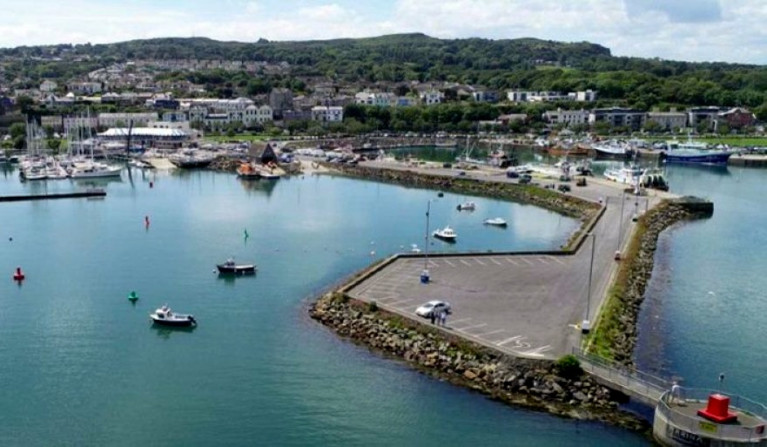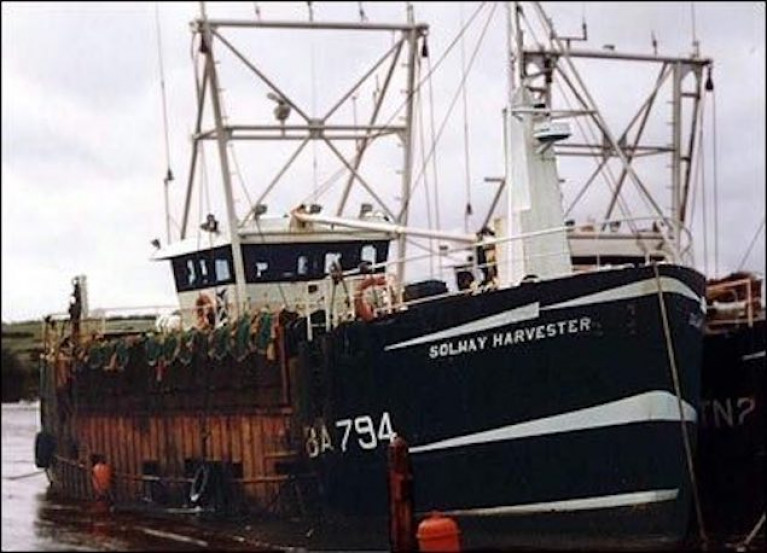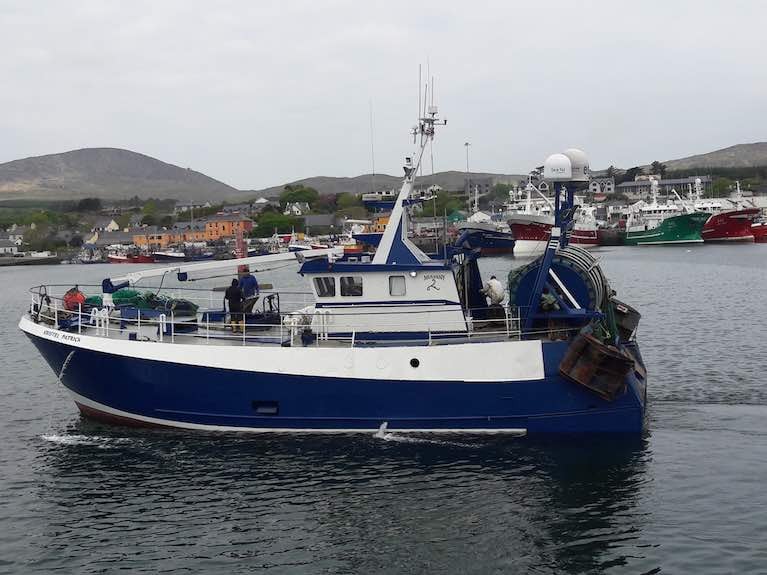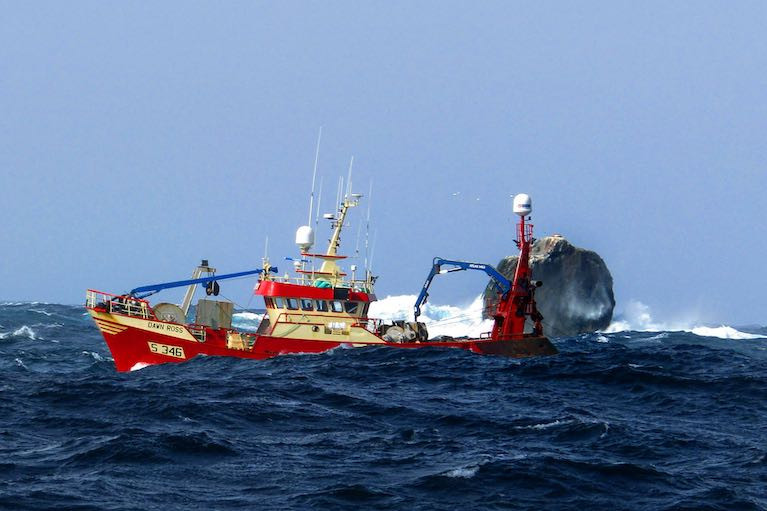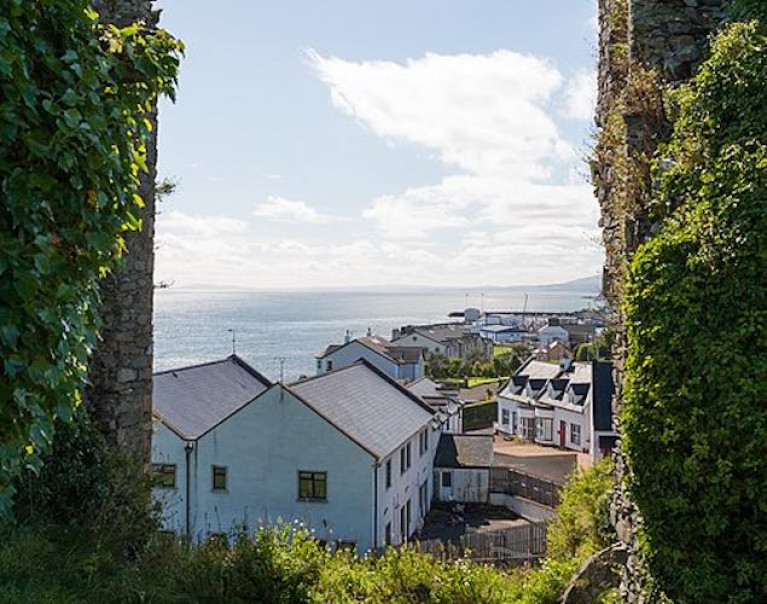Displaying items by tag: Fishing
Search for Missing Fishing Vessel off North Wales Continues
The search for a missing fishing vessel with three people on board continues off the coast of North Wales.
HM Coastguard has been co-ordinating an extensive search to find the vessel since just after 10 am today (28 January) after it failed to return when it was expected.
Rhyl, Bangor and Llandudno Coastguard Rescue Teams have been sent along with RNLI lifeboats from Rhyl, Llandudno, Conwy and Beaumaris.
The HM Coastguard search and rescue helicopter from Caernarfon and a fixed-wing Coastguard aircraft have also been assisting with the search.
North Wales Police are also involved and broadcasts have been made to alert vessels in the nearby area. Despite the extensive search to find the vessel and its crew, nothing has been found so far.
Duty Controller for HM Coastguard Rob Priestley said: “We are continuing to search a wide area to try and find this vessel with all the assets we have at our disposal. We’re also asking other vessels in the area to keep a look out for anything that might also assist the search.”
McConalogue Says He Has Raised Ireland's "Serious Concerns" at EU Level Over Disproportionate Brexit Fish Deal
Marine minister Charlie McConalogue says he has expressed Ireland’s “serious concerns” at EU level about a “ disproportionate burden being borne” by it in relation to fish quotas lost under Brexit.
Mr McConalogue said he conveyed this at an informal EU agriculture and fisheries council on January 25th, and Ireland was “awaiting to hear how this matter will be urgently addressed.”
An Oireachtas agriculture and marine committee was told last week that Ireland had taken a disproportionately large hit in the final deal.
Killybegs Fishermen's Organisation chief executive Sean O’Donoghue said that if the total loss to nine coastal states is valued at €182 million, Ireland should have lost some €20 million in quotas.
Instead, Ireland’s loss has been calculated at over €42 million, he noted.
 Killybegs Fishermen's Organisation chief executive Sean O’Donoghue
Killybegs Fishermen's Organisation chief executive Sean O’Donoghue
The frontloading of cuts over five-and-a-half years to 60 per cent this year was also unexpected, he said.
“We have formally requested our government to go back to Brussels and demand that the eight other EU coastal countries step up to the plate and take a proportionate hit on the Brexit deal,” he said.
Mr McConalogue said this week that he had made it clear that "ministers at council must have a direct engagement in the negotiations between the EU and UK to ensure that the fishing industry and other stakeholders have confidence that their concerns and voices are heard and understood".
The informal EU council meeting focused on the preparation for discussions between the EU Commission and the UK on setting TACs and fish quotas for 2021, he said.
Existing provisional quotas are due to end in March, and full-year TACs must be negotiated with Britain before then.
New procedures for interactions with the UK are being put in place, Mr McConalogue said, and member states’ priorities for the negotiations were discussed at this meeting.
“In relation to setting TACs for 2021, I made clear that Ireland is fully committed to respecting setting quotas in line with fishing at maximum sustainable levels (MSY) where this is known, and for other stocks all available data and information must inform TAC setting,” he said.
Tributes to Fishing Industry Leader Hugo Boyle
Tributes have been paid to fishing industry leader Hugo Boyle, who died unexpectedly earlier this week.
Mr Boyle, a father of four from Falcarragh, Co Donegal, was chief executive of the Irish South and East Fish Producers’ Organisation (IS&EFPO).
“A gentleman who was highly respected right around the coast” is how south-east vessel owner Caitlín Uí Aodha of the IS&EFPO described him.
Fellow industry leaders said his loss would be felt both in Ireland and Europe.
Mr Boyle, a former fisherman and vessel owner who was based in Achill Sound, Co Mayo, had been ill for several years.
However, he had remained involved in all aspects of the industry, including monitoring the crucial Brexit negotiations.
He had participated in the fishing industry’s emergency online meeting on December 28th last with Taoiseach Micheál Martin and Cabinet colleagues over the damaging impact of Brexit deal.
“He had an incredible legal mind, was a calming but informed influence, and knew what battles to pick,” Ms Uí Aodha said.
“At the time of our own loss with the sinking of the Tit Bonhomme, he was very supportive to me and my family,” she said.
Her husband Michael and four of his five crew died when the vessel hit rocks at Adam’s island on the mouth of Glandore Harbour, Co Cork, on January 15th, 2012.
Her sentiments were echoed by Killybegs Fishermen’s Organisation chief executive Sean O’Donoghue, who also expressed his condolences to Mr Boyle’s wife Ellen, and daughters, Alison, Denise, Elaine and Aisling and wider family.
“I knew Hugo since the mid-eighties when I was in the Department of Marine, and he was very involved in discussions on Celtic Sea herring,”Mr O’Donoghue said.
“He was both a good friend and a good colleague, and was very calm – always seeking solutions, rather than dwelling on problems,”he said.
“His experience as a vessel owner and a fisherman served him well in his role with the IS&EFPO, and he had the ability to seek compromises – our French counterparts will miss him for his role in seeking solutions to the scallop issue in the English Channel, “Mr O’Donoghue said.
Irish Fish Producers Organisation (IFPO) chief executive John Ward said the fishing industry had “lost a good friend”, recalling how he was a member of the IFPO when he was fishing.
Mr Ward said he was experienced and with an “infectious good humour and big smile”.
Irish South and West Fish Producers’ Organisation chief executive Patrick Murphy said that “Hugo's commitment to the industry never faltered”.
It was “evident right up until recently, when he participated, contributed and clearly outlined his organisation’s position in the numerous online meetings we had with officials”, Mr Murphy said.
“Hugo’s practical sensible proposed measures, once implemented would in my view certainly mitigate much of the damage which was decided behind the closed doors in Europe that will hurt the people he worked so hard to protect,” he said.
Mr Murphy recalled one instance of Mr Boyle’s many gestures of kindness, after a late arrival of fishing industry representatives into Dublin Airport.
“Hugo being the gentleman he was insisted on driving me to the hotel where I was staying. Despite our tiredness and the late hour, Hugo insisted upon this detour, taking at least an hour of his time, as it was out of his way on his long journey home,” Mr Murphy said.
EU Member States Must "Share Burden" of Brexit Fisheries Loss, Industry Leader Says
EU coastal states “haven’t taken the same hit” as Ireland in losing access to British fishing grounds and “must burden share”, an industry leader said.
The fishing industry is “not interested” in financial compensation, and wants to ensure it “gets fish back” if coastal communities are to survive, Killybegs Fishermen’s Organisation (KFO) chief executive Sean O’Donoghue has said.
Speaking on Newstalk Radio’s Pat Kenny Show today before appearing at an Oireachtas committee, Mr O’Donoghue said that if the total loss to nine coastal states is valued at 182 million euro, Ireland should have lost some 20 million euro in quotas.
Instead, Ireland’s loss has been calculated at over €42 million, he noted.
Dedicated junior fisheries minister
Also speaking on The Pat Kenny Show, Donegal priest Fr John Joe Duffy of Burtonport accused the Government of taking a “subservient” approach to Europe on the issue, and called for a dedicated junior fisheries minister.
Ireland’s overall quota loss has been valued in a post-Brexit economic analysis at 43 million euro, which is some 9 million euro more than originally estimated by Government ministers
After the Brexit deal was signed, Irish foreign affairs and marine ministers Simon Coveney and Charlie McConalogue had stated that the loss to Ireland of fishing quotas was €34 Million or 15% of €252 Million.
An economic analysis of fish quotas increases the Irish loss figure to €43 Million - but the landing figure for 2020 has been adjusted upwards to €288 Million to maintain the 15% cut total.
The Department of Agriculture, Food and Marine has not responded to queries about the figure change.
The recently published analysis calculates that the final quota reduction (after the transition period) for key stocks amounts to a 26% reduction in the western mackerel quota share, Ireland’s largest fishery
It calculates a 14 per cent reduction in Ireland’s largest non-pelagic fishery, Nephrops (prawns).
It says that the whitefish fisheries where there are notable reductions are: Hake (Celtic Sea) 3%, Haddock (Celtic Sea) 11%, Haddock (Irish Sea) 16%, Haddock (Rockall) 22.6%.
Other reductions are Megrim (Celtic Sea) 8%, Megrim (West of Scotland (19%), Anglerfish/Monkfish (Celtic Sea) 7%, Anglerfish/Monkfish (West of Scotland) 20%, and Pollack (Celtic Sea) 9%.
It calculates a 96 per cent reduction for herring (Irish Sea).
It also says that several smaller whitefish quotas in the Donegal/West of Scotland area have seen sizeable quota share reductions.
The reductions are graduated over the 5.5 year period of reciprocal access, but the largest part of the reduction, 60%, is between 2020 and 2021.
The analysis notes that the Brexit agreement contains a list of 105 stocks for which the UK has, or will receive, a Total Allowable Catch (TAC) share.
“ For 41 of these stocks, the UK’s share will remain unchanged from its current relative stability share. For eight stocks there is no transition period and the new UK quota shares, it is understood, apply from 2021,” it states.
“For the remaining stocks, 60% of the transition to the new shares occurs in 2021, followed by 70% in 2022, 80% in 2023 and 92% in 2024,” it says, and by 2025 the transition to the new quota share is “complete”.
The Brexit fisheries impact is discussed on The Pat Kenny Show here
Anchovies, Blue Tuna, Sardines & Marine Tourism; Do State Agencies Talk to Each Other?
"Someone needs to bang the table and bang heads together. Do State agencies talk to each other?"
That blunt statement caused me to think a lot this week when I am still disappointed at official attitudes towards the marine sector.
I was talking to a man who has forty years' maritime experience and is the 'go-to' marine scientist and biologist often quoted and interviewed in the media about climate change, warming seas and the effects on waters around the coast.
Kevin Flannery of Dingle knows the State system from the inside. He was a fisheries inspector, and he was in an angry mood when we spoke.
There are times when I am astonished by what I am told about State organisations and their attitude towards the maritime sector. What he said was a shocking example, raising the question – Do State agencies talk to each other?
Anchovies & Sardines
Afloat highlighted recently the discovery of a potential new fishery on the South/West Coast, anchovies and sardines, an indication that species not before in Irish waters in big numbers are moving here, as other species may be moving away because of the effects of climate change on water temperatures. Anchovies are a little silver fish mostly found in the Mediterranean, Pacific and Atlantic, noted for their salty flavour and used, amongst other food consumption purposes, on pizzas, salads, sandwiches, sauces, dressings and dips.
Irish fishermen catching Bluefin Tuna
"My worry is that other nations will claim rights to them like they did to stop Irish fishermen catching Bluefin tuna in our own waters and another fishery will be lost because of neglect. This fishery is sustainable, so why are our agencies not organising to ensure it remains ours? There is an urgent need and potential for development and diversification. The fishery is sustainable, so why are our agencies not organising to ensure it remains ours?" Kevin Flannery told me. "There are also stocks of sardines showing, bream, octopus, and we are getting reports of all these. Are the agencies talking to each other at all, or is it 'never the 'twain shall meet between them? Somebody needs to bang heads together and say these resources are ours".
Listen to the Podcast to below how upset Kevin Flannery is about the attitude of State agencies.
Marine tourism projects involving boats
And, following up on my report last week about the Department of Finance refusing pandemic financial assistance to Killary Fjord Boat Company because its boats move, I remain astonished that this attitude persists amongst the officials of that Department. I had a few 'interactions' with the Department when seeking an explanation. Their Press Office told me they were referring my questions to 'the Revenue', then came back with a long statement, the core point of which was that a "qualifying business premises is a building or other similar fixed physical structure in which a business activity is ordinarily carried on.' The statement had a Departmental pun. In preparing the support scheme, "it was necessary to provide appropriate anchor points." Maybe the civil servants responsible think boats are best anchored!
It doesn't show a particularly positive attitude towards marine tourism projects involving boats. "Significant additional resources were allocated by Government in the Budget to provide help to different sectors including tourism," the Department said. But does this include boats which move?
A loss to Irish fishermen
A final point about official attitudes, where I saw the Department of the Marine contradict its own Minster. It issued a "preliminary analysis" of the transfer of fishing quota shares from Ireland/EU to the UK under the Brexit deal where it estimated the loss to Irish fishermen at €43 Million. This contradicted the lower figure of €34 million given by its own boss, Marine Minister Charlie Monologue and Foreign Affairs Minister Simon Coveney after the deal was agreed on Christmas Eve.
From the past week, I am left wondering if the reality of Ireland being an island nation is fully understood.
Marine Minister McConalogue Opens up More Ports to Irish Fishing Vessels on British Register
Minister for Marine Charlie McConalogue has come to the rescue of Donegal islanders with fishing boats registered in Northern Ireland who were blocked from landing into their nearest port by the Brexit deal.
Northern Irish vessels and boats owned by fishermen in the Republic which are on the British register were informed that they could only land into two designated ports - Killybegs, Co Donegal and Castletownbere, Co Cork – after January 1st.
The State’s Sea Fisheries Protection Authority (SFPA) had recently initiated an investigation into “unauthorised” landings into Greencastle, Co Donegal.
However, Mr McConalogue says he has arranged for vessels on the British register to land into five additional ports - Greencastle, Burtonport and Rathmullan in Donegal, Ros-a-Mhíl in Galway and Howth in Co Dublin.
He said he was “ working to make sure the necessary notifications and requirements are in place to have these ports operational from Monday, February 1st”.
Under the new designations, Ros a Mhíl and Howth will be able to accommodate landings of demersal (whitefish) catch from vessels under 24 metres, Monday to Friday from 10 am to 10 pm.
Greencastle, Rathmullen and Burtonport will be designated for non-quota species landings from vessels under 18 metres and will operate from 2 pm to 8 pm from Monday to Friday, he said.
These designated hours are due to the need for oversight by the SFPA, he said.
He described it as “an important decision which will allow fishers in small vessels to continue their livelihoods in a safe manner”.
“Following Brexit, it is important now more than ever, to support our fishers and fishing communities and to do all we can do help them continue their livelihoods,” Mr McConalgoue said.
He said that any UK Northern Ireland registered boats landing into any of the seven Irish ports will have to comply with additional documentary and more procedural requirements than before Brexit.
The SFPA had confirmed last week in response to queries about its investigations that UK registered fishing vessels, including those vessels which are registered to addresses in Northern Ireland, are subject to new EU fisheries and food safety controls”.
These “reflect the UK’s status now as a third country,” the SFPA said.
It confirmed Killybegs and Castletownbere as the only two ports allowed to continue to receive landings under two separate designations - the Illegal, Illegal, Unreported, Unregulated – Third Country (IUU-TC) designation and North East Atlantic Fisheries Commission (NEAFC) regulations.
The development prompted calls last week by a Northern Irish fish industry executive for “Dublin to reciprocate” an arrangement where all seven Northern Irish ports are still open to vessels on the Republic’s register.
The west Cork vessel Rachel Jay was first Irish vessel since the Brexit regulations came into force to land into Lisahally in Derry with mackerel caught off the Scottish coast.
Alan McCulla of the Anglo North Irish Fish Producers’ Organisation said that while he welcomed the Rachel Jay and other Irish landings, he questioned why “when Belfast saw this coming, Dublin did not”.
“The Northern Irish authorities were able to take measures to keep our ports open to Irish vessels, “he said, adding that “the EU still rules Ireland’s waves”.
Under legislation which was controversially amended in 2019, Northern Irish vessels can fish within the Republic’s six-mile limit – but the legislation does not provide for landing.
The Sea Fisheries Amendment Act 2019 formalised in law a “voisinage” agreement which had existed between the Republic and Northern Ireland since the 1960s, and which was challenged by Greencastle fisherman Gerard Kelly.
20th Anniversary of 'Solway Harvester' Sinking Marked
Fishing communities on both sides of the Irish Sea have marked the 20th anniversary of the sinking of a scallop dredger with the loss of seven lives off the Isle of Man.
The Celtic League non-governmental organisation has also marked the deaths of skipper Andrew Mills (known as Craig), (29), his brother Robin Mills (33), their cousin David Mills (17), Martin Milligan (26), John Murphy (22), David Lyons (18) and Wesley Jolly (17).
All seven men died when their dredger was caught in a storm off the Scottish coast on January 11th, 2000.
The men were all from the Isle of Whithorn area of Dumfries and Galloway, and had set out from Kirkcudbright in south-west Scotland the previous day.
They fished off the Manx coast and planned to steam home on January 11th, but sought refuge in stormy conditions with gale-force nine winds on the northeast coast of the Isle of Man.
Nothing further was heard of the vessel until an emergency beacon was picked up later that day.
The search and rescue mission organised included Manx lifeboats from Ramsey, Port St Mary and Douglas, as well as the Isle of Man Steam Packet Company ferry Ben-My-Chree.
An Irish Air Corps helicopter was involved in the joint search involving vessels and aircraft from Prestwick in Scotland and Anglesey in Wales. The next day two unopened lifeboats from the vessel were found.
The wreck was found 18 km from the Manx coast in 35m of water on January 15th, 2000. The bodies of the seven crew members were on board, but the British Government refused to fund the rescue operation and recovery of the crew.
The Manx government-funded the £1 million the salvage operation. The crew were later returned to their native Scotland for burial.
The British Marine Accident Investigation Branch found that the vessel capsized because its fish room flooded, making it unstable.
Water drained unnoticed into the fish room through scuttles (hatches) on the deck which did not have their covers on.
It said a pump was blocked, and an alarm which warns when the bilges are filling with water was broken - meaning the skipper had no warning the room was flooding.
In the rough seas, the vessel rolled sideways to 30-40 degrees. Tonnes of fish and gear shifted to starboard and water became trapped on the main deck.
Although buoyancy would have allowed the vessel to roll back to 20-25 degrees, the Solway Harvester never regained stability and gradually rolled onto its side.
As Rockall Simmers, McConalogue's Department Accused of "Chaotic" Response to Brexit Permits
Marine minister Charlie McConalogue’s department has been criticised for its “chaotic” handling of a permit system for Irish fishing vessels to British waters after Brexit.
Only a fraction of the entire Irish fleet has been given permits to continued access to British waters – albeit with a reduced quota as a result of Brexit.
“Rockall is not the only issue - the Department of Agriculture, Food and Marine had no plan B,” Irish South and West Fish Producers’ Organisation chief executive Patrick Murphy has said.
Mr Murphy described the past week as “chaotic”, and said he was shocked at how unprepared the department was.
Mr McConalogue’s department has confirmed that only 141 vessels out of the full list of 1900 Irish vessel have been given temporary permits to date.
 Mayo prawn skipper Paddy Mulvany - concerned about the handling of a permit system to UK waters
Mayo prawn skipper Paddy Mulvany - concerned about the handling of a permit system to UK waters
It said that it had requested authorisation on December 31st for all 1900 Irish registered vessels to fish in the British exclusive economic zone (EEZ) between 12 and 200 nautical miles, after notification by the European Commission of the need to do so.
It said it was “actively and urgently seeking from the UK authorities, through the EU Commission, that all Irish vessels be granted authorisation to fish in UK waters”.
Mr Murphy said arrangements should have been put in place by department officials “months ago”, as preparation for a negative Brexit outcome.
Mayo prawn skipper Paddy Mulvany, who fishes with his 20m Kristel Patrick for 40 per cent of the year in the Celtic Sea, was critical of the department’s “arbitrary” selection which did not include his vessel
He has also questioned the department’s use of the term ” priority vessel” in its response to him last week.
“What does that make the rest of us – second class?” Mulvany said.
"Unless this is sorted, anyone who wants to sell on a boat won't be able to realise its value if it does not have access to British waters," he explained.
Ireland stands to be the biggest loser in a Brexit deal which sees EU member states lose 25 per cent of catch overall, but separate administrative authorisation for continued access “should not have been left to the last minute”, Mr Murphy said.
Killybegs Fishermen’s Organisation (KFO) chief executive Sean O’Donoghue said that the department’s approach was “pragmatic”, in ensuring those vessels preparing to go to sea on January 1st had authorisation.
Mr O’Donoghue said the initial permits only last for three weeks, and expects a second list will be issue for the full year. He said he understood Britain “couldn’t handle” the full list.
Meanwhile, Mr McConalogue and Minister for Foreign Affairs Simon Coveney have said there remains an “increased risk of enforcement action being taken by Scottish fisheries control authorities against Irish vessels operating in the waters around Rockall at present”.
This follows last week’s warning by Marine Scotland to a Donegal vessel fishing within 12 nautical miles of Rockall.
Sinn Féín marine spokesman Padraig MacLochlainn said he had warned the then marine minister Michael Creed in 2019, when the issue last flared up, that a 2013 agreement between the Irish and British governments “essentially recognised British sovereignty over Rockall”.
The 2013 agreement signed by former Tánaiste Eamon Gilmore established a single maritime boundary between the Exclusive Economic Zones (EEZs) of the two countries and parts of their Continental Shelves.
“This is a shameful agreement that has never been ratified by the Dáil,” Mr MacLochlainn said.
Ireland “could have supported the governments of Iceland and Denmark in demanding shared sovereignty and fishing rights around Rockall but chose not to do so”, Mr MacLochlainn said.
There remains an increased risk of enforcement action being taken by Scottish fisheries control authorities against Irish fishing vessels operating in the waters around Rockall at present according to a joint statement by the Ministers for Foreign Affairs and Agriculture, Food and the Marine issued this evening.
The Minister for Foreign Affairs and the Minister for Agriculture, Food and the Marine met to discuss recent developments in relation to Rockall.
As Afloat reported previously, the Ministers says they are 'fully aware' of interactions between an Irish fishing vessel, and a Marine Scotland patrol vessel in recent days.
The Irish Government has been in contact with the relevant Scottish and UK authorities.
The statement says that through this engagement, the Irish Government is seeking to address the issues involved, reflecting the longstanding fisheries tradition in the area. Taking account of the new EU-UK Trade and Cooperation Agreement, this may also require contact with the European Commission.
In addressing these issues, the Minister for Foreign Affairs and the Minister for Agriculture, Food and the Marine, as well as their respective officials, are considering all options for further engagement on the issues involved and are continuing to work closely together.
While engagement continues, the government says there remains an increased risk of enforcement action being taken by Scottish fisheries control authorities against Irish vessels operating in the waters around Rockall at present.
Restrictions on where Northern Ireland Fishing Boats Can Land Catch Has Created a 'Hard Border'
The BBC has reported that fishermen in the north-west are saying that Post-Brexit restrictions on where Northern Ireland boats can land their catch in the Republic of Ireland have "created a hard border on the island",
A new Irish government rule came into effect on 31 December 2020 meaning that Northern Ireland registered vessels can now land only at two Irish ports – Killybegs, the largest fishing port in the country located on the south coast of the County Donegal or at Castletownbere on the Beara Peninsula in County Cork. This has created serious problems for crews in the north-west.
Skipper Darrin McAvenue has a Northern Ireland registered boat though he fishes out of Greencastle, his home port on County Donegal's Inishowen peninsula on the Northern shore of Lough Foyle. He said he "has always "fished in Northern Ireland waters around the north coast. So we have a Northern Ireland-registered boat to do that," he told the BBC's Radio Foyle.
Up until the end of 2020 he could return to Greencastle to land his catch. "That's where we tie our boats, that is where I live and where most of the crew lives," he said.
On Wednesday, he said Irish government officials notified him he could no longer do so.
Instead, he landed his catch in Portrush on the North Co Antrim coast of Northern Ireland, before returning home. He said that when docking in Greencastle he was also told by Sea Fisheries Protection Authority officials that he "had broken the law by entering a southern port".
"I am still in shock - the last couple of years we have been told there is no hard border, then this," he said. Fishing is "the only way we know how to pay the mortgage and put food on the table. To be told you cannot make a living is hard to accept - I don't know where we stand, everything is up in the air".
It is reported that the N I Department of Agriculture Environment and Rural Affairs (DAERA) has written to Northern Ireland fishermen to notify them of the new Irish government rules. And BBC reports that a DAERA spokesman said following the end of the implementation period the "UK is now outside the regime applying to EU fishing vessels.
The Sea Fisheries Protection Authority (SFPA) in the Republic of Ireland has asked DAERA to point out to Northern Ireland licensees that landings in the Republic should only be at the designated ports of Killybegs and Castletownbere. The regulations say that UK licensed boats may not land into nor access services in any other ports in the Republic".
Another Greencastle skipper Liam O'Brien said the rule changes are "devastating" for the local-based crews working Northern Ireland-registered vessels. "These boys have been kicked in the stomach by their own government".
BBC also reports that fishing boats registered in the Republic are still able to use facilities in Northern Ireland and this week Sinn Féin's Donegal TD Padraig MacLochlainn told Radio Foyle that the new rules were a "huge issue for smaller vessels and boats".
The BBC has asked the Department of Agriculture, Fisheries and the Marine in the Republic of Ireland for comment but has yet to receive a response.


























